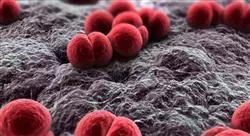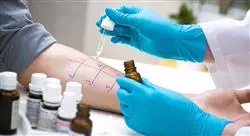
Certificate
The world's largest faculty of nutrition”
Description
The study of the human Microbiota opens a door to knowledge, bringing great value to the nutritionist's curriculum"
Scientific evidence increases the quality of trauma surgery. Keeping up-to-date is key to providing better care to our patients
Numerous pieces of scientific evidence have implicated the intestinal microbiome and its metabolic potential in various pathological conditions in recent years, giving rise to new therapeutic strategies to control and regulate this ecosystem. The study of this ecosystem is a field that is rapidly advancing scientifically, and it is universally accepted that to achieve an adequate state of health it is also necessary to have a "healthy" Microbiota.
Our microbiota undergoes changes as a consequence of the influence of multiple factors, diet, lifestyle, pharmacological treatments.... generating alterations in this bacterial ecosystem and the abnormal interaction that the organism could have with it, is related to certain processes: allergic, acute and chronic intestinal diseases, obesity and metabolic syndrome, neurological diseases, dermatitis and other alterations in the dermis, and even some types of cancer.
In this sense, this postgraduate diploma in Respiratory Microbiota and Allergies for Nutritionists gives the ease of access to the inespecialization and the interest that awaken among professionals the topics related to the Microbiota, its Eubiosis and Dysbiosis and the problems related to them.
Also, during the postgraduate diploma, the use of Probiotics and Prebiotics will be discussed in depth, as well as the growing market launch of new products with very specific strains for very specific problems and diseases related to the respiratory system.
This will allow nutrition professionals to be up to date with all the scientific advances in this regard, to offer the patient a more accurate specialization on the subject, guiding them to recover and maintain the bacterial Eubiosis through food to achieve a good state of health, in addition to collaborating positively with the recommended medical treatment.
Improve your knowledge in Respiratory Microbiota through this program, where you will find the best didactic material with real cases"
This postgraduate diploma in Respiratory Microbiota and Allergies for Nutritionists contains the most complete and up-to-date scientific program on the market. The most important features of the program include:
- Development of practical cases presented by experts in Respiratory Microbiota and Allergology.
- Its graphic, schematic and eminently practical contents, with which they are conceived, gather a scientific and practical inespecialization on those disciplines that are indispensable for professional practice.
- New developments on Respiratory Microbiota.
- It contains practical exercises where the self-evaluation process can be carried out to improve learning.
- With special emphasis on innovative methodologies in Microbiota in Respiratory and Allergology.
- All this will be complemented by theoretical lessons, questions to the expert, debate forums on controversial topics, and individual reflection assignments.
- Content that is accessible from any fixed or portable device with an Internet connection.
This postgraduate diploma is the best investment you can make in the selection of a refresher program for two reasons: in addition to updating your knowledge in Respiratory Microbiotics, you will obtain a certificate from one of the most reputable educational institutions: TECH”
The program includes, in its teaching staff, professionals belonging to the field of medicine and nutrition, who pour into this specialization the experience of their work, in addition to recognized specialists from reference societies and prestigious universities.
Its Multimedia Content, elaborated with the latest Educational Technology, will allow the Professional a situated and contextual learning, that is to say, a Simulated Environment that will provide an immersive specialization programmed to train in real situations.
This program is designed around Problem Based Learning, whereby the professional must try to solve the different professional practice situations that arise during the academic year. The professional will be assisted by an innovative interactive video system created by renowned and experienced experts in sports nutrition.
The postgraduate diploma allows you to exercise through simulated environments, which provide immersive learning programmed to train for real situations.
This 100% online Specialist Diploma will allow you to combine your studies with your professional work while increasing your knowledge in this field.
Objectives
The main objective of the program is the development of theoretical and practical learning, so that the professional can master in a practical and rigorous way the study of Microbiotics in the daily practice of your profession. In this sense, The postgraduate diploma in Respiratory Microbiota and Allergies for Nutritionists responds to the continuous demand of professionals for a quality specialization in this area, which serves as a means to use food as a preventive or therapeutic tool in maintaining the health of their patients of all ages.
This postgraduate diploma is designed for you to update your knowledge in Respiratory Microbiota and Allergies, with the use of the latest educational technology, to contribute with quality and safety to decision making in this new field"
General Objectives
- This postgraduate diploma fulfills a need of today's society, a quality and up-to-date specialization that allows the use of microbiological therapy as a preventive or therapeutic tool for the maintenance of health
- Offer a comprehensive and broad view of the current state of the field of human Microbiota, in its broadest sense, the importance of the balance of this Microbiota as a direct effect on our health, with the multiple factors that influence it positively and negatively
- Argue with scientific evidence how the Microbiota and its interaction with many non-digestive pathologies, of autoimmune nature or its relation with the deregulation of the immune system, the prevention of diseases and as a support to other medical treatments, are currently being given a privileged position
- Promote work strategies based on the integral approach of the patient as a reference model, not only focusing on the symptomatology of the specific pathology, but also looking at its interaction with the Microbiota and how it may be influencing it
- Encourage professional stimulation through continued specialization and research
Specific Objectives
- Understand the structure of oral ecosystems
- Know the causes of alterations of the oral microbial ecosystem, oral dysbiosis, and its relationship with different oral disease states
- Know the structure of the respiratory tract and composition of the Microbiota and Microbiome
- Understand why the alteration of the Microbiota of the respiratory tract occurs and its relationship with the different diseases of the respiratory tract
- Know the correct way to carry out a therapeutic manipulation of the Microbiome of the oral cavity in prevention and treatment of diseases related to it
- Know the correct way to carry out a therapeutic manipulation of the Microbiome of the respiratory tract in the prevention and treatment of diseases related to it
- Delve into the current lines of research related to the Oral Microbiota and its applications in Nutrition
- Know the physiology of the immune system
- Understand the implication of nutrition and lifestyle and their interaction with the immune system and the Microbiota
- Know the bidirectional relationship between Microbiota and the neuroimmunoendocrine system
- Understand the involvement of the Microbiota in the triggering of nervous system diseases such as anxiety, depression, schizophrenia and others
- Understand the functioning of the gut-brain Microbiota
- Delve into the current lines of research on the subject
- Know the reasons that cause changes in the Microbiota in patients with food exclusion diets: Eosinophilic Esophagitis (EoE)
- Delve into the alteration and recovery of the intestinal Microbiota in patients with gluten intolerance and celiac disease
- Know the role of probiotics in this regard
- Delve into the current lines of research
A unique, key and decisive training experience to boost your professional development"
Postgraduate Diploma in Respiratory Microbiota and Allergies
Discover the fascinating world of the respiratory microbiota and allergies with this Postgraduate Diploma program in Respiratory Microbiota and Allergies from TECH Technological University. In an environment where respiratory health is increasingly important, this program will provide you with the knowledge necessary to understand the relationship between the microbiota and allergies, as well as the tools for their prevention and treatment.
Start strengthening your professional profile
With the online modality, you will be able to access the contents from anywhere and at any time that fits your schedule. At TECH Technological University, we strive to offer you a flexible and quality learning experience, adapted to your needs. Through our online platform, you will have access to cutting-edge materials, online lectures and interactive activities that will allow you to delve into the subject in a dynamic and participatory way. The Postgraduate Diploma in Respiratory Microbiota and Allergies will provide you with an in-depth understanding of the mechanisms of interaction between the microbiota and the respiratory system, as well as allergies and their impact on health. You will learn about the latest research and advances in the field, and acquire practical skills for the diagnosis, treatment and follow-up of allergic diseases. Our teaching team is made up of recognized experts in the field of respiratory microbiota and allergies, who will guide you throughout your learning and will be available to answer your questions and queries. In addition, you will be supported by a community of students passionate about respiratory health, with whom you will be able to exchange knowledge and experiences. Become a reference in the study of respiratory microbiota and allergies. Get the necessary tools to face the challenges of respiratory health in the 21st century and contribute to the well-being of people. Enroll in the Postgraduate Diploma in Respiratory Microbiota and Allergies at TECH Technological University and take a step forward in your professional career!










